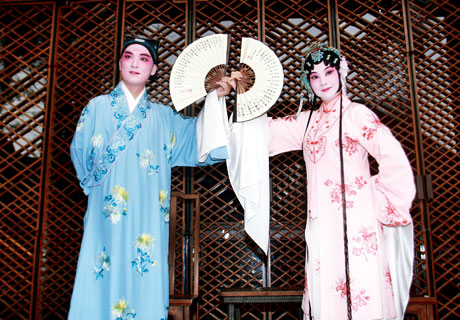A Paean to Immortality
 |
The People's Republic of China does not have a national flower – but if it
did, that flower would no doubt be the peony.
Indeed, the peony –
which was briefly the official flower of the Qing Dynasty – was chosen as
national flower in a nationwide survey in 1994, although never officially
ratified as such. A much-loved subject for poets and painters, the peony is a
symbol of prosperity, pride, and honor. This dates back, as the story is told,
to a cold, snowy night in the Tang Dynasty when the formidable Empress Wu Zetian
was drinking hot rice wine with a friend. All of a sudden, she got it in her
head that she wanted to see every flower in her garden blossom – in the dead of
winter.
"Tomorrow I shall walk about my park," she says in the
presumably apocryphal tale. "Send word at once to let the Spring God know, bid
all the flowers blossom in the night, before the morning wind has time to
blow."
Word was sent and all the flowers bloomed as commanded –
except the proud peony. Unwilling to follow such despotic orders, the peonies
collectively uprooted themselves and moved from the imperial capital of Chang'an
(now Xi'an) to distant Luoyang, where they have thrived ever since.
Tang Xianzu (1550-1616), the author of "The Peony Pavilion" – one
of China's most famous peony-themed works – certainly embodied many of the
flower's best qualities. He was brave and defiant and iconoclastic. He admired a
radical school of Neo-Confucianism remembered by the slogan "The streets are
full of sages!" meaning that we all possess within ourselves the power to become
a sage. He passed the first level of the civil service examination at 13 and the
second level at 20. It took him some time to pass the third and final
level – in part, it seems, because he refused to tutor the sons of Emperor Wan
Li's Grand Secretary, a man he did not respect. This delay earned him a
reputation for integrity, which was further burnished when he dared send Wan Li
a "Memorial on Ministers and Advisers" that criticized a subsequent Grand
Secretary for abuse of power. Wan Li was not happy, and Tang was demoted to the
job of prison warden and exiled to Guangdong, then known as "the pestilent
south." Eventually he gave up on public service and devoted himself to
writing drama, poems and essays (many of them political).



- Sign In
- Cancel
- Remember me
- Forgot Password
- Don't have an account? Create one
- 1Update: China’s First-Quarter GDP Growth Beats Expectations at 5.3%
- 2Cover Story: Alibaba Renews Strategy Reset to Revive Growth Momentum
- 3Alibaba Diverts from New Retail Push in Strategy Reckoning
- 4Exclusive: Chinese Insurer’s Ex-Chairman Disappears From Public View, Sources Say
- 5In Depth: Chinese Education Firms Learn Tough Lessons Overseas
- 1Power To The People: Pintec Serves A Booming Consumer Class
- 2Largest hotel group in Europe accepts UnionPay
- 3UnionPay mobile QuickPass debuts in Hong Kong
- 4UnionPay International launches premium catering privilege U Dining Collection
- 5UnionPay International’s U Plan has covered over 1600 stores overseas


